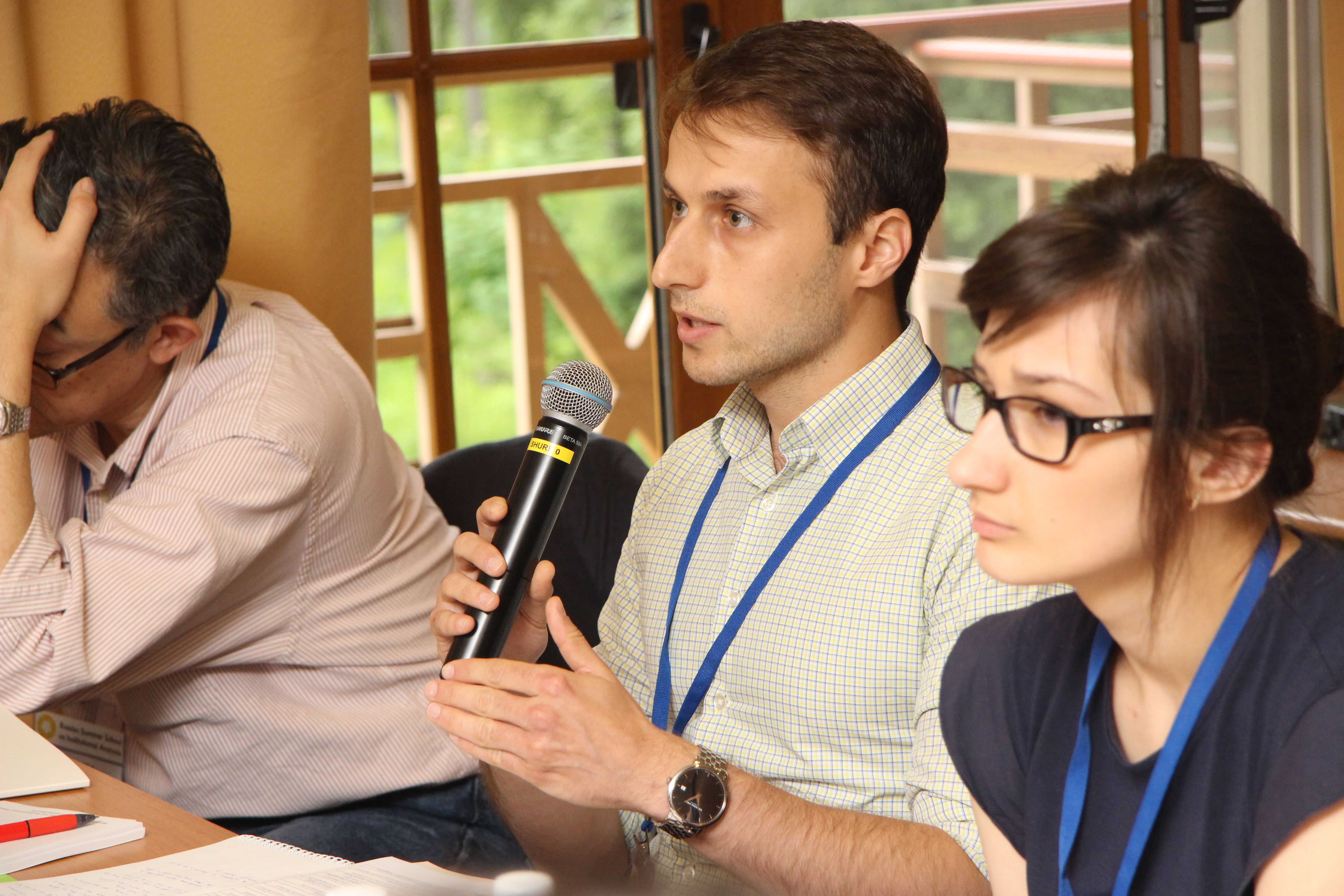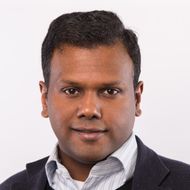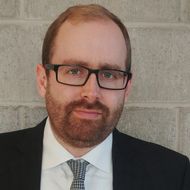‘Scholars Are Humans, and You Shouldn’t Be Afraid of Them’

ICEF not only trains professionals in economics and finance, but also provides a perfect start for an academic career. Daniil Esaulov, lecturer, coordinator of student research work at ICEF and manager of ICEF Academia project, talked to us about how ICEF develops research skills, what students do at ICEF Academia, and why one shouldn’t be afraid of authorities in research.
How ICEF Teaches Students to Do Research
I am an ICEF graduate myself, and two years ago, I was offered the opportunity to coordinate student research here. By then, I already had my Candidate of Sciences degree and some experience of working at the HSE Laboratory of Empirical Analysis of the Enterprises and Markets in Transition Economies, so I had already become involved in the topic of academic research. I love working with students. Today, in addition to teaching, I also organize theses defences and other processes related to term papers and theses, as well as research on undergraduate and master’s programmes. I also coordinate student classes as part of ICEF Academia. In some ways this is a unique project, which evolved five years ago at ICEF at the initiative of Udara Peiris, Emiliano Catonini, Alexis Belianin and a few other teachers.
ICEF Academia is a programme of optional courses and events for students who are successfully mastering the core curriculum and yearn for deeper academic and personal development. The key aim of the programme is to involve talented students in a community of people who are as high-achieving as themselves and build communications with teachers who carry out extensive research. The programme offers additional classes, as well as student events, workshops and conferences.
At ICEF Academia, students are invited to research projects and discussions with teachers, both in formal and in informal settings
Among other things, they learn to work with ideas that underpin the basis of any research.
ICEF Academia is not only for students who are going to pursue PhDs. The programme gives its students the skills that will be useful in business operations and in studying on business master’s programmes, such as LBS or Imperial College. Research skills, such as the ability to gather information and structure it, make conclusions and summarize reports, are essential for working in the analytical department of any company.
What They Do at ICEF Academia
The classes at Academia are made up of two stages, which, starting from the second year of undergraduate studies, are conducted simultaneously,—training and research. The training stage is called the ‘Advanced Training Programme’ (ATP) and is a set of optional courses, with grades added to the academic record. These are effectively advanced classes in core courses, offered during the first three years of studies.

The second stage, the Advanced Research Programme (ARP), is dedicated to research. It usually attracts senior students who are working under the supervision of ICEF researchers with a PhD. They organize workshops for students, aimed at developing their research skills, from working with academic literature, to workshops on various software for data analysis.
Udara Peiris, Associate Professor at ICEF, lecturer at ICEF Academia

ARP aims to attract students who are motivated to carry out research and learn more than is taught as part of the general curriculum. Our task is to get student feedback about what they’ve learned and how clearly they now understand the process of research. This mutual communication provides the students with an understanding of how to adjust to the real world and build a successful career in finance. We teach not only specific disciplines, but also processes – of analytical thinking, digging deeper into the problem, and asking questions. The programme also aims to inspire the best students and create a professional perspective for them.
We also encourage our students to participate in external academic events and to meet the global academic community. Annually, ICEF reimburses the costs of participation in the London School of Economics Summer School for the best ICEF Academia students.
How ICEF Academia Can Help Prepare for a PhD Programme Application
We prepare our students for their PhD application individually: choosing the school, writing the motivation letter, etc. In terms of research thinking, which is essential for a career in academia, a key to this is communication with researchers. In the academic community, discoveries are often born during communication with peers, rather than ‘desk studies’. When scholars choose a university on the academic job market, they should always pay attention to the community of their future colleagues, looking at their interests in order to become part of an environment that fosters their ideas.
Even when a student has a specific academic supervisor, ICEF Academia organizes networking with other researchers, who can help make the view more complete and provide deeper expertise.
Do Academia Students Write a Special Thesis?
All ICEF students are taught at one level. The standard rules on the structure of theses are the same for everyone, and everyone is able to write a strong thesis if they follow these rules and work with their academic supervisor regularly. Outstanding papers, which, with minor changes, can be published in academic journals, get the highest grade of 10 points. This year has proved that not only students who are going to pursue a career in academia have been able to get ‘tens’. They also include students who see their future in big financial organizations. The general background which students receive is sufficient to allow them to make an independent choice, and they don’t need to do it while they study. They can get experience in the industry, and then continue their studies. Their undergraduate course is only the beginning of their path.
Steven Kivinen, Assistant Professor at ICEF, Lecturer at ICEF Academia

I work in of economic theory, and there are a lot of staff and students interested in this field at ICEF. The atmosphere and dynamics of our communications foster a wonderful environment for research work. Leading economists conduct workshops at ICEF, and their insights and ideas are often invaluable. Speaking about my work with students as part of ARP, I have enjoyed supervising some outstanding undergraduate theses. ICEF students are curious and ambitious, and during ICEF Academia classes, I try to involve them in research, demonstrating my own passion for it. I always encourage their enthusiasm to carry out research in the field they are really interested in. At the same time, I try to help them set their research problem correctly.
Undoubtedly, studies as part of the research track (ARP) can be an important line in the CV, an indicator of the candidate’s high potential for companies, and a positive sign for the university where the student is applying for their PhD. The programme also provides the student with recommendations from globally renowned researchers working at CIEF, which demonstrates the student’s serious motivation. After graduation, ICEF Academia students receive a certificate.
What the Transition to Online Work Has Changed in Academic Work
This year, we have had online theses defence processes for the first time, and the experience was difficult, but very interesting. The process of organising defences in such a form can be compared to organizing a big conference. Almost 150 graduates defended their theses after the ICEF bachelor’s programme, and over 50 various participants worked on the thesis committees. In total, this meant several parallel sessions for six hours over the course of a week. Moving this important part of the study process online required detailed elaboration of the system, which me and my colleagues had never previously faced.
60 ICEF graduates are pursuing or have already got their PhDs, with 27 of them having entered PhD programmes right after graduating from bachelor’s programme.
11 ICEF graduates teach at Stanford, Georgetown, Lausanne, Vienna, Florida State, London Business School, NES and other schools.
I was particularly worried about technical issues, which are often hard to solve at a distance. Thanks to the support from my colleagues, including those from other universities, who were eager to share their experience, I believe, everything went well. However, according to the students’ feedback, this format was not convenient for everyone. Some of the students said they had to spend hours in front of the computer, since they were afraid to miss their turn. But nevertheless, most feedback about the online defence processes has been positive.
One of the teachers said they were missing the traditional pizza after the online defence process
Despite these unusual circumstances, a lot of very strong theses have been defended this year. Almost half of the students got the highest grades: for comparison, last year, this was about 30%. Probably, their ‘home walls’ helped them. Importantly, the May international exams were postponed, and the students, in fact, had more time for preparation. The experience of transitioning to online systems has proved that some of the formats can be introduced in the studies as regular practice. For example, the situation has improved student/teacher communication in many cases, since this doesn’t require any logistics now.
Who Teaches at ICEF Academia
Teachers at Academia are ICEF researchers who pursue active academic careers, write papers, get published in academic journals and participate in conferences, so their experience is precious. For many of the teachers, working with students grows into something bigger than term papers and theses. Students may work on some external projects with the lecturer, as has happened with Udara Peiris, who is also a consultant at the Central Bank. Students get career opportunities in the industry and form their first professional networks.
The experience of Udara Peiris, Emiliano Cantonini, Steven Kivinen and other lecturers proves that working with students at ICEF Academia is mutually beneficial and helps share interest in certain fields.
How ICEF Academia Relieves the Fear of Authority
Schools often make their students afraid to debate with the teacher, and many students at ICEF are still frightened to take part in discussions. This is true for all types of communication, including email, social media, questions at lectures, or informal conversations between classes. In Russia, unlike in many international universities, students are a bit younger, which means that they, like at secondary school, see teachers as a kind of authority which whom it is difficult to start a conversation. When I started working and became part of the ICEF researcher community, I opened a new world: they are very interesting people.
Researchers are also humans, and you shouldn’t be afraid of them. It’s important to understand that one can learn a lot from them, even outside classes. I still blame myself for not talking enough to teachers during my master’s studies at ICEF. I can definitely say that classes at ICEF Academia bridge the gap between students and teachers. Reinforcing communication between students and representatives of academia is probably the most important goal of the project.
Daniil Esaulov
Deputy Department Head, Office of Research Methods
Emiliano Catonini
Assistant Professor, International College of Economics and Finance
Steven Kivinen
Assistant Professor, International College of Economics and Finance
Udara Peiris
Associate Professor, International College of Economics and Finance

